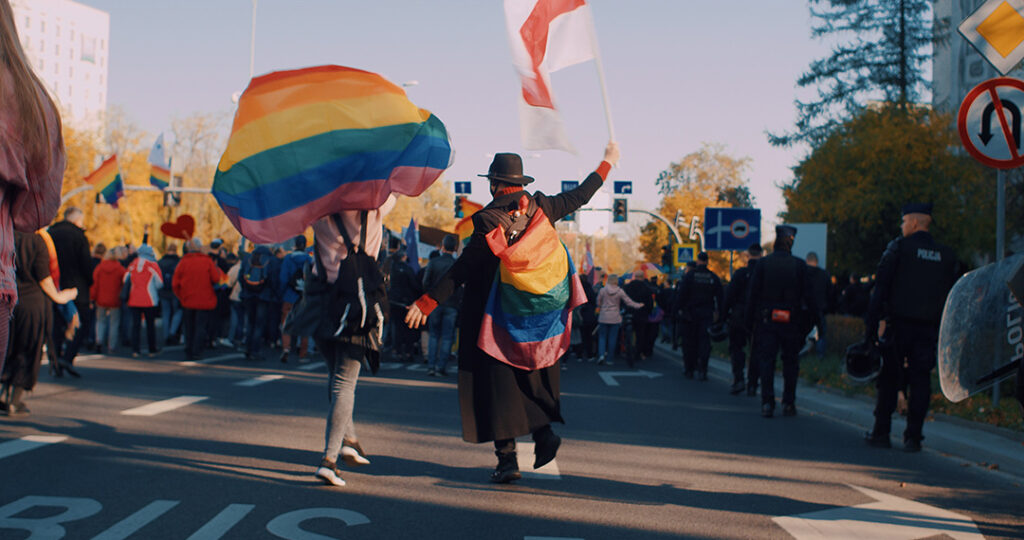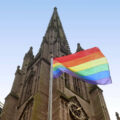Insights from the dashboard: Religion’s response to LGBTQ+ rights
Insights from the dashboard: Religion’s response to LGBTQ+ rights
Discover vital insights on religion’s evolving response to LGBTQ+ rights. The EARS dashboard provides these and more insights.
Tides of change: religion’s evolving stance on LGBTQ+ issues
The religious landscape is undergoing a significant transformation regarding LGBTQ+ rights, as evidenced by recent media coverage. This evolution is strikingly illustrated in the EARS dashboard, a collection of summaries from European media articles focusing on religion and society. Through the dashboard, we have gleaned several insights into the representation of LGBTQ+ topics in European media over the past month and year, and how this has been portrayed in the news. The accompanying graphs display the percentage of articles addressing LGBTQ+ issues within the dashboard over the last month (Graph 1) and year (Graph 2). These graphs highlight a dynamic pattern of interest, with peaks that correspond to major events. These events challenge traditional views and have ignited widespread discussion.

Graph 1: percentage of articles in the EARS dashboard covering the topic LGBTQ+ in the last month

Graph 2: percentage of articles in the EARS dashboard covering the topic LGBTQ+ in the last year
In this dynamic phase, the graphs are more than mere indicators of interest; they reflect the evolving heartbeat of societal progress. As religious institutions grapple with themes of emancipation and LGBTQ+ rights, the world watches, engages, and evolves. But what have been the key developments in the past month?
The Vatican’s inclusive steps
The Vatican made headlines affirming that transgender individuals can be baptised and become godparents in the Catholic Church, provided it does not cause public scandal. This move, approved by Pope Francis, is seen as a significant stride towards trans inclusion. The announcement, which revises previous restrictions, is part of a broader effort by the pope to welcome LGBTQ+ individuals into church participation.[1]
Echoing this inclusivity, Danish bishops advocate for gender-neutral wedding rituals, replacing ‘husband’ and ‘wife’ with ‘spouse’. This initiative aims to modernise the theological aspects of marriage, eliciting mixed reactions among priests. Some embrace its poetic nature, while others fear it may strip away traditional elements that affirm the marriage’s grounding in God’s grace. This debate highlights the broader conversation on liturgical relevance and unity within the Danish Church. [2]
UK’s intersectional approach
In the UK, the intersection of policy, education, and identity is highlighted by the government’s preparation of guidelines for supporting transgender students in schools. Set for release by Christmas, these guidelines will address gender-specific facilities and sports participation. They emerge amid debates on parental knowledge of children’s gender identity decisions and recent bans on trans conversion therapy.[3]
Synod on synodality: a call for inclusion
In addition to these trends, the Synod on Synodality, discussing the future of the Catholic Church, highlighted the urgent need for women’s roles in governance. However, it concluded without adopting the radical changes sought by liberal and LGBTQ+ activists, particularly omitting any mention of ‘LGBTQ+’ in its summary report. Although it left open possibilities for contentious issues, it did not resolve debates on same-sex unions or women’s roles in the Church, setting the stage for future discussions with another Synod scheduled for October 2024.[4]
Resistance against progressive waves
Resistance to these progressive waves is also evident in the United States, where political figures have clung to traditionalist viewpoints, defending anti-LGBTQ+ positions with religious texts. Mike Johnson, the new Republican US House Speaker, defended his anti-LGBTQ+ views on Fox News, stating his adherence to the Bible as his worldview. [5]
Similarly, in the Czech Republic, Czech Senator Jiří Čunek, a traditional conservative and former leader of the Christian Democratic Union – Czech People’s Party (KDU-ČSL), is a vocal advocate for upholding Christian values in politics. He has expressed criticism towards the trend of Christian parties in Europe, including his own, for their shift towards liberalism, which he views as a departure from their core principles. Čunek endorses the Hungarian model of family law, highlighting the significance of traditional family structures. He also voices his concern about the growing acceptance of progressive ideologies within Czech society. Furthermore, Čunek expresses his disappointment over the diminishing support for conservative values in Czech politics and criticises the role of mainstream media in influencing public opinion. [6]
Looking ahead: faith, identity, and modernity
Thus, the dashboard insights from this past month show that the evolving religious response to LGBTQ+ rights is a complex and multifaceted issue. While significant strides have been made towards inclusivity, the journey is far from over. Resistance to change, often rooted in traditional beliefs, highlights the diverse perspectives within religious communities. As society continues to evolve, the role of religion in LGBTQ+ rights remains a dynamic and crucial aspect of the broader conversation on equality and acceptance.
Learn more on the EARS dashboard
The EARS dashboard allows you to gain insight into a large number of topics, including LGBTQ+. It is a free tool that allows you to make connections like those described above, and to find out about relationships between interesting subjects across Europe. Please visit the dashboard to learn more.
Learn more about religion and society on the EARS Dashboard
Sources
[1]Trans people can be baptised in church and be godparents, says Vatican
[2] Danish bishops want genderneutral wedding ritual
[3] UK Government To Tell Schools How To Deal With Transgender Students ━ The European Conservative
[4] Synod on Synodality Disappoints Radical Liberals ━ The European Conservative
[5] ‘Go pick up a Bible’: Speaker Mike Johnson defends anti-LGBTQ+ views
[6] “I would vote for Hungarian-type family laws,” Says Czech Senator






